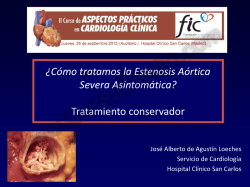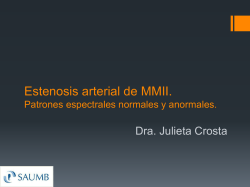
¿Qué hacer ? ¿Cómo evaluarla ? - CACI
ESTENOSIS VALVULAR AORTICA ASINTOMATICOS ¿Qué hacer ? ¿Cómo evaluarla ? Prof Dr Ricardo E Ronderos FASE FACC Director Instituto de Cardiologia La Plata Jefe Serv de Diagnostico por Imágenes Cardiovasculares ICBA Director Magister US en Cardiologia Universidad Nacional de La Plata Argentina [email protected] [email protected] ESTENOSIS VALVULAR AORTICA ETIOLOGIA ESTENOSIS AORTICA Válvulas reumática y degenerativa calcificada Aortic Sclerosis • Aortic sclerosis and aortic stenosis most likely represent different stages in the same disease process Olsen MH... Devereaux RB; LIFE substudy. Am J Cardiol 2005;95:132-6. Evolución de la estenosis aórtica Cuadro: Ross J Jr, Braunwald Aortic Stenosis Circulation 1968 ESTENOSIS AORTICA Calculo de gradientes GRADIENTE MAXIMO GRADIENTE MEDIO www.manbit.com/ERS/images%5CPressureRecovery.jpg • Important when the ascending aorta is small (< 3 cm diameter) ESTENOSIS VALVULAR AORTICA AREA POR PLANIMETRIA ESTENOSIS AORTICA ECO 3D Diástole Sístol e AREA VALVULAR AORTICA ECUACION DE LA CONTINUIDAD Q1 Q2 A1 x V1 A2 x V2 A3 x V3 A4 x V4 Q 1 = Q2 A1 V1 V2 Volumen Sistólico VTI TSVI VS = 70 -130 ml Thomas J. EchoSAP. 1998 Gutierrez Chico, Zamorano, Prieto Moriche et al Eur Heart Journal (2008) 29, 1296 Evaluación de la EAo 1998 * AAo 1 cm2 Evolución de la Estenosis Aórtica Asintomática (n =123) Otto C. Circulation 1997 Evolución de la E Ao Asintomática V Max > 4 m/seg Grad Medio > 45 mm Hg Bermejo. JACC 2003 Evolución de la Estenosis Aórtica Asintomática NO HAY DIFERENCIAS ENTRE AVA < 1 cm2 y < 0,75 cm2 Bermejo. JACC 2003 Clasificación de la Gravedad de la EAo Indicador Leve Moderada Severa Velocidad del jet (m/s) < 3.0 3.0-4.0 > 4.0 Gradiente medio (mm Hg) < 25 25-40 > 40 Area valvular (cm2) > 1.5 1.0-1.5 < 1.0 Area valvular indexada (cm2 /m2) < 0.6 BONOW ET AL CIRCULATION 2008 :1;18 CRITERIOS DE SEVERIDAD EAE/ASE RECOMENDACIONES EN E AO Baumgartner et al. European Journal of Echocardiography (2009) 10, 1–25 • ACC/AHA guidelines (2006) defined degrees of AS (largely based on cath studies): – Mild: AVA 1.5-2.0cm² – Moderate: 1.01.5cm² – Severe: <1.0cm² and mean gradient >40mmHg Carabello BA. NEJM 2002;346:677-682 A Parisian Shoemaker named Carolus Rayger died suddenly (1672) - reported by Bonetus in 1679 - “Sepulchretum” – aortic valves of “bone” • 622 patients with severe AS – Peak velocity ≥ 4 m/sec – Mean Age = 72 ±11 yrs – Mean FU = 5.4 ± 4.0 yrs • Sudden death without preceding symptoms occurred in 1%/year of unoperated pts Circulation 2005;111:3290-3295 ESTENOSIS AORTICA SEVERA ASINTOMATICOS PARAMETROS DE RIESGO Muerte subita 1-3 % por año Aumento de riesgo de muerte subita en ptes con: Gradiente maximo > 100 mmHg Disminucion del area > 0.15 cm2/ año Severo aumento de la masa miocardica del V Izquierdo OTTO C et al Circulation 2002 Kaplan-Meier Life Table Analysis for Probability of Event-Free Survival Over 60 Months for Patients with Asymptomatic Severe Aortic Stenosis, According to Aortic Valve Area <0.7 cm2 or 0.7 cm2 1.0 0.7 cm2 (23 patients) 0.8 Probability 0.6 of eventfree survival 0.4 <0.7 cm2 (43 patients) 0.2 P=0.0021 0.0 0 10 20 30 Months 40 Amato et al: Heart 86:381, 2001 50 60 Kaplan-Meier Survival Curves Comparing Asymptomatic Severe Aortic Stenosis Patients with and without Aortic Valve Replacement 1,0 0,8 AVR (n=99) P<0.0001 Cum survival 0,6 0,4 No AVR (n=239) Survival AVR No AVR 0,2 1 yr 94% 67% 2 yr 93% 56% 5 yr 90% 38% 0,0 0 2 4 6 8 10 12 11 6 (AVR) (no AVR) Years No. at risk 99 87 78 71 239 140 104 86 64 68 55 57 46 38 35 28 25 20 18 14 Pai et al: Ann Thorac Surg 82:2116, 2006 Survival in Asymptomatic Severe AS n = 622 Survival (%) No Symptoms: AVR Symptoms : AVR No Symptoms: ØAVR Symptoms: ØAVR Time (yrs) after Dx asymptomatic severe AS Brown ML, et al J Thorac Cardiovasc Surg 2008 ESTENOSIS AORTICA ASINTOMATICA • Las E Ao severas tiene mayor mortalidad que las de menor severidad Independientemente de los sintomas • La cirugia de RVAo se acompana de mejor sobrevida que el tratamiento medico en E Ao severa asintomatica • La muerte subita esta presente en severas 1%/ ano • DEBEMOS ENTONCES OPERAR A LOS ASINTOMATICOS? Survival Free of Symptoms of Severe AS Censored at AV Surgery 100 • AS is Progressive • Average peak velocity 80 Survival free of 60 symptoms (%) 40 • increases 0.3 m/sec per year Average AVA decreases 0.1 cm2 per year Otto et al Circulation. 1997;95:2262 20 0 0 1 2 3 4 5 6 7 8 9 10 47 25 15 9 6 Years No. at risk 397 265 185 128 80 Pellikka, Circulation 111:2005: 3290-5 Calcific Aortic Stenosis Courtesy of William Edwards, M D Event-free survival (%) NEJM 343(9):611, Aug 2000 92% 100 No or mild Ca++ 84% 75% 75 50 Mod or severe Ca++ (same outcome) 60% 47% 25 P<0.001 20% 0 0 1 2 3 4 25 101 23 48 20 38 17 21 9 7 5 CALCIFICACION Y EVENTOS EN ESTENOSIS AORTICA SEVERA Y LEVE A MODERADA Rosenhek R et al New Eng J of Med 2000 Eur Heart J 2004 Late event-free survival by AVC n= 100 patients Messika-Zeitoun D…Sarano ME. Circulation 2004;110:356-362 ESTENOSIS AORTICA CONTROVERSIAS • Pacientes sintomáticos con estenosis aórtica moderada de acuerdo a los parámetros hemodinámicos • Asintomáticos con baja capacidad funcional ? Ejercicio! BAUMGARTNER, OTTO : JACC: 2009: 54; 11; 1012 PRUEBA DE ESFUERZO STRESS TEST 1. Stress testing in asymptomatic severe aortic stenosis 2. Dobutamine stress testing in low gradient-low EF aortic stenosis Heart 2001; 86:381-386 Patients (N = 66) Asymptomatic Severe (AVA≤1.0) EKG interpretable for treadmill CAD excluded by angio No comorbidity limiting treadmill Positive stress test • CP or presyncope • EKG ∆ • ∆SBP ≤20 mmHg Probability of Event-Free Survival •In multivariate analysis, a hazard ratio of 7.43 was calculated for patients with a positive versus a negative exercise stress test. Although asymptomatic in daily life, 6% of the patients (4/66) experienced sudden death; all these had a positive exercise test and an aortic valve area of < 0.6 cm2. n = 50 n = 50 Circulation. 2005;112[suppl I]: I-377–I-382 Patients (n=69) • Asymptomatic • Severe (AVA ≤ 1 cm2) • Normal LV EF Positive Stress Test • CP or dyspnea • EKG ∆ • ∆SBP ≤20 mmHg Lancellotti, P. et al. Circulation 2005;112:I-377-I-382 Abnormal Stress Test Mean Pressure Gradient with Exercise Incremental Value of Exercise Echocardiography Lancellotti, P. et al. Circulation 2005;112:I-377-I-382 Sudden Cardiac Death • 0/179 patients with normal stress test had SCD • 9/183 patients with abnormal stress test had SCD Rafique et al. Am J Cardiol 2009;104:972–977 •No signficant complications with stress testing Am J Cardiol 2009;104:972–977 ACC/AHA Surgical Indications in Aortic Stenosis Circulation 2006; 114: 84-231 ACC/AHA Valve Guidelines • Combined risk of surgery and late complications of a prosthesis (2-3% per year) • Risk of Death (1% per year) Circulation 2006; 114: 84-231 REFLEXIONES • La cuantificación de la severidad de la estenosis aórtica presenta inconsistencias y deberian revisarse las Guias ( < 0,7 cm2 ?) • Las características anatómicas deben se tenidas en cuenta al momento de interpretar datos inconsistentes • El cálculo de las variables utilizadas en la cuantificación debe ser cuidadoso metodológicamente ESTENOSIS AORTICA CONCLUSIONES • El cálculo del área valvular es la medida mas confiable para determinar la severidad de la estenosis aórtica • Las diferentes técnicas de medición deben ser aplicadas cuando existen dudas, pero la ecuación de continuidad parece la más sólida • La coincidencia con magnitud de los gradientes es frecuente, pero su ausencia NO debe excluir el diagnóstico. Altos gradientes en válvulas con escaso deterioro, es posible en aortas pequeñas ESTENOSIS AORTICA CONCLUSIONES • Las condiciones hemodinámicas y la función ventricular deben ser consideradas aunque no se calculen parámetros como impedancia vascular • Los sintomáticos deben someterse a RVAO. La ausencia de síntomas debe corroborarse con ejercicio, observando tiempo libre de disnea y P Arterial • La edad es un factor de riesgo para el RVAO, pero NO CONTRAINDICACION !. Cirugía y Reemplazo percutáneo alternativas posibles ESTENOSIS AORTICA SEVERA ASINTOMATICOS PARAMETROS DE RIESGO Menos de 6 minutos libres de disnea en treadmill protocolo Naughthon Caida de la Presion arterial sistolica > 15 mmHg durante esfuerzo en treadmill Arritmias ventriculares inducidas por el esfuerzo y/ o severa depresion del segmento ST INDICACIONES DE CIRUGIA • EAO SINTOMATICA • ESTENOSIS AORTICA CRITICA • EAO ASINTOMATICA CON TEST FUNCIONAL + ( caida TA en max, angina y/o disnea en el max esfuerzo)
© Copyright 2026

